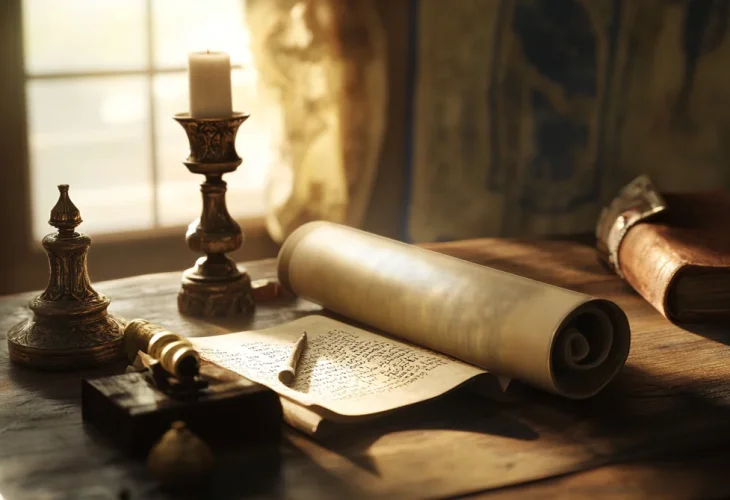Torah Personalities
The Man Behind the Rambam: The Legacy of Rabbi Maimon
Though his name is mentioned daily in Jewish study, the story of Rabbi Maimon, the father, teacher, and guide of the Rambam, remains largely unknown

The Unsung Scholar Who Shaped a Giant
Throughout Jewish history, the Jewish people have been blessed with towering spiritual giants. At times, the greatness of some has cast a shadow over others, though equally great in their own right. Such is the case with Rabbi Maimon, the father of the Rambam (Maimonides). Every time the Rambam ("Rabbi Moshe ben Maimon") is mentioned, his father by default is mentioned too. And yet, few are familiar with the man behind the name.
Rabbi Maimon was one of the great scholars of his generation and one of the Rambam’s earliest teachers. But the towering brilliance and lasting influence of the Rambam across a millennium have obscured the legacy of the one who raised him, not just physically but spiritually. It was Rabbi Maimon who paved the way for his son’s greatness in both this world and the next.
Scholar, Judge, and Author of an Overlooked Classic
Long before the Rambam’s renowned Iggeret Teiman (Epistle to Yemen), his father penned an earlier, less well-known work called Iggeret HaNechama (Letter of Consolation). At the time, Rabbi Maimon served as a dayan (rabbinic judge) in the court of Córdoba, then a prominent Jewish center in Spain. He had studied under Rabbi Yosef ibn Migash, who was considered the last of the Geonim and the first of the Rishonim, and passed down his teachings to his son Moshe. The Rambam himself described Rabbi ibn Migash with admiration and considered himself a disciple through the Torah he absorbed from his father.
Around 1150, Rabbi Maimon left his post in Córdoba and moved to Fez, Morocco, the city of the great halachic authority, the Rif (Rabbi Yitzchak Alfasi). Why the drastic relocation? Because Rabbi Maimon had heard of a remarkable scholar in Fez: Rabbi Yehuda HaKohen ibn Soussan. His own teacher had passed away, and he knew his sons, particularly the young and exceptionally gifted Moshe, needed someone extraordinary to guide their growth. Unwilling to entrust his son to a typical school, Rabbi Maimon uprooted his family in search of the right teacher. Indeed, under Rabbi Yehuda’s guidance, Moshe would become the "Great Eagle" of his generation.
Faith Under Persecution
But their time in Fez was fraught with danger. A radical Islamic sect called the Almohads had seized control of Morocco and began violently persecuting Jews. Their goal: to stamp out any religion other than Islam. Fear gripped the Jewish community, especially in Fez. In response, Rabbi Maimon composed Iggeret HaNechama, a powerful letter of faith and encouragement. In essence a short book, it opens with stirring words:
"In the name of the Eternal God, a letter from our teacher and master, Rabbi Maimon the son of our teacher and master Rabbi Yosef, of blessed memory, in the city of Fez, sent to one of his brothers for comfort and spiritual delight, to console the grieving souls suffering the sorrows of exile, and those despairing of redemption as each day and night pass against our will, and the killings for the sanctification of His Name and for the performance of His commandments..."
The letter strengthened many, but the oppression only worsened. Eventually, the Jewish community of Fez was forced to flee. The famed poet Rabbi Avraham Ibn Ezra, a contemporary of Rabbi Maimon, also escaped the region and later composed the lament "Ahah Yarad Alai Sefarad" ("Alas, Spain Has Fallen") in response to the brutality of the Almohads.
Rabbi Maimon, too, left Fez and traveled with his family to the Land of Israel. Tragically, Rabbi Yehuda ibn Soussan was killed by the regime. Meanwhile, the young Moshe, destined to become the Rambam, was already developing his Torah scholarship and beginning to write. Rabbi Maimon passed away in the Land of Israel and is buried in Tiberias, near his illustrious son. Afterward, the Rambam settled in Egypt, where his greatness would blossom in full.
Jews did not return to Fez until decades later, after the fall of the Almohad dynasty.
A Legacy Remembered
Rabbi Maimon may not be a household name today, but his fingerprints are on every page of the Rambam’s works. His sacrifice, foresight, and unwavering commitment to Torah during a time of exile and persecution shaped the trajectory of Jewish history.

